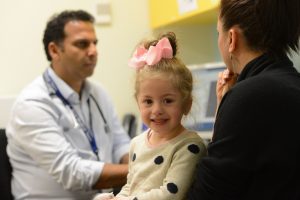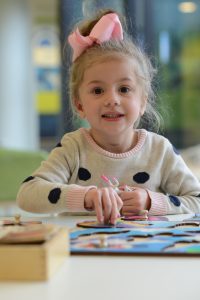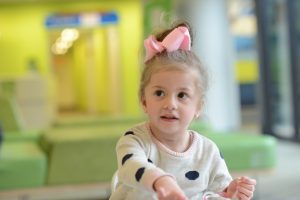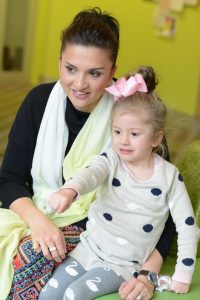Nine fractures, three respiratory arrests, one tracheotomy and one life-saving liver transplant.
Although Alexandra Bacon’s journey has been heart wrenching, seeing her cheeky smile now, you’d never know just how difficult it was.
At ten weeks old, Alex was diagnosed with a life-threatening condition called biliary atresia, in which the ducts that carry bile from the liver to the gallbladder are either absent or fail to develop normally. Bile is then trapped inside the liver, causing irreparable damage.
“It’s your worst nightmare is coming true,” said Sondra, Alex’s mum.
“I remember very clearly the specialist saying, ‘Oh, we have a problem here’ and I could see that it was serious, but I was in a state of shock and didn’t really hear what they were saying because all I could hear was my heart in my throat. We just wasn’t prepared for anything to go wrong.”
From here, Alex became a patient at the RCH. At three months old, she underwent a Kasai Procedure, which surgically bypasses the failing bile ducts and prolongs the life of the liver.
Despite the surgeon’s best efforts, Alex’s liver was damaged beyond repair and she needed a transplant to survive. Due to her extensive liver damage, Alex failed to gain weight and developed Osteopenia, a condition where the bones become soft, causing her nine fractures in 14 months.
Another curve ball struck when Alex began to have respiratory arrests. Her longest arrest was a devastating 14 minutes long. Alex was diagnosed with Tracheomalacia, whereby the cartilage in her windpipe hadn’t developed properly, causing her tracheal walls to collapse and prevent breathing.
“She started choking in the RCH clinic waiting room and before I knew it had turned dark blue and stopped breathing. Our gastroenterologist Dr George Alex came running down the corridor and actually resuscitated her himself. From there Alex was taken to the Paediatric Intensive Care Unit where she had her tracheotomy and four weeks later we got the call about the new liver.”
Though Alex was in the operating theatre for nearly 12 hours, the marathon surgery was a success.
“Seeing Alex after the transplant was quite overwhelming, but we were just really happy and relieved that it all went well.”
“We thanked the surgeon and he was so modest. We kept thinking, how can we possibly thank him and his team enough for saving our child’s life?”
Alex now has a new lease on life, but continues to visit the RCH every few months for check-ups.
“She’s a really happy little girl and very spunky. She goes at a hundred miles an hour. We couldn’t be more grateful to the RCH for everything they’ve done for us. Without the hospital, our little girl wouldn’t be alive.”




